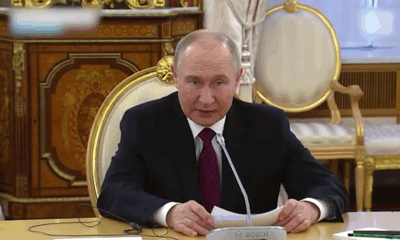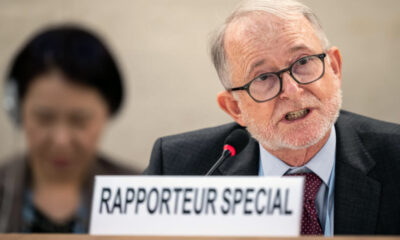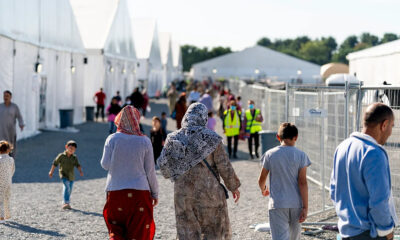COVID-19
WHO warns vaccines alone won’t curb spread of Coronavirus

The World Health Organization (WHO) on Monday said governments and individuals cannot rely solely on vaccines to curb the spread of the Coronavirus.
The organization said vaccines alone will not keep them ‘safe’ and that basic public health measures remain the basis of the response.
Tedros Adhanom Ghebreyesus, WHO Director-General, said at a media briefing that: “Vaccines will help to save lives, but if countries rely solely on vaccines, they’re making a mistake. Basic public health measures remain the foundation of the response.”
For public health authorities, that means testing, contact tracing, isolation, supported quarantine and quality care, while for individuals, it means avoiding crowds, physical distancing, hand hygiene, masks and ventilation.
”This is a global crisis that requires a consistent and coordinated global response,” he added.
In the past week, Ghebreyesus noted, the number of reported cases of Covid-19 increased for the first time in seven weeks.
”Reported cases increased in four of WHO’s six regions: the Americas, Europe, South East Asia and the Eastern Mediterranean – so we don’t report increases in Africa and the Western Pacific.
”We’re working to better understand these increases in transmission. Some of it appears to be due to relaxing of public health measures, continued circulation of variants, and people letting down their guard,” he added.
Ghana and Côte d’Ivoire started vaccinating health workers against Covid-19, becoming the first countries to start vaccination campaigns with doses supplied through COVAX, the vaccines pillar of the Access to Covid-19 Tools (ACT) Accelerator.
”A further 11 million doses will be delivered this week. Between now and the end of May, 237 million doses of vaccines will be allocated to 142 participating economies and countries in COVAX,” he said.
UAE’s Emirates SkyCargo and Etihad Cargo have signed separate agreements with UNICEF to prioritise the transport of Covid-19 vaccines, essential medicines, medical devices and other critical supplies to help fight the pandemic, gulfbusiness reported.
According to the report the UNICEF drive convenes a number of partners capable of distributing essential supplies to more than 100 markets in support of the COVAX Facility, the global effort aimed at equitable access to Covid-19 vaccines.
In January 2021, Emirates SkyCargo joined hands with three other Dubai-based entities- DP World, International Humanitarian City and Dubai Airports to form an alliance for the rapid transport of Covid-19 vaccines to the developing world through the emirate, report added.
The UAE has administered a total of 6,028,417 doses of the Covid-19 vaccine till March 1.
COVID-19
WHO declares end to COVID global health emergency

The World Health Organization said Friday that COVID-19 no longer qualifies as a global emergency, marking a symbolic end to the devastating coronavirus pandemic that triggered once-unthinkable lockdowns, upended economies and killed millions of people worldwide.
The announcement, made more than three years after WHO declared the coronavirus an international crisis, offers some relief, if not an ending, to a pandemic that stirred fear and suspicion, hand-wringing and finger-pointing across the globe, AP reported.
The U.N. health agency’s officials said that even though the emergency phase was over, the pandemic hasn’t finished, noting recent spikes in cases in Southeast Asia and the Middle East.
WHO says thousands of people are still dying from the virus every week, and millions of others are suffering from debilitating, long-term effects.
“It’s with great hope that I declare COVID-19 over as a global health emergency,” WHO Director-General Tedros Adhanom Ghebreyesus said.
“That does not mean COVID-19 is over as a global health threat,” he said, warning that new variants could yet emerge. Tedros noted that while the official COVID-19 death toll was 7 million, the real figure was estimated to be at least 20 million.
Tedros said the pandemic had been on a downward trend for more than a year, acknowledging that most countries have already returned to life before COVID-19.
He bemoaned the damage that COVID-19 had done to the global community, saying the pandemic had shattered businesses, exacerbated political divisions, led to the spread of misinformation and plunged millions into poverty.
When the U.N. health agency first declared the coronavirus to be an international crisis on Jan. 30, 2020, it hadn’t yet been named COVID-19 and there were no major outbreaks beyond China.
More than three years later, the virus has caused an estimated 764 million cases globally and about 5 billion people have received at least one dose of vaccine.
In the U.S., the public health emergency declaration made regarding COVID-19 is set to expire on May 11, when wide-ranging measures to support the pandemic response, including vaccine mandates, will end. Many other countries, including Germany, France and Britain, dropped most of their provisions against the pandemic last year.
When Tedros declared COVID-19 to be an emergency in 2020, he said his greatest fear was the virus’ potential to spread in countries with weak health systems.
Most recently, WHO has struggled to investigate the origins of the coronavirus, a challenging scientific endeavor that has also become politically fraught.
COVID-19
COVID-19 in Iran: Nearly 900 new cases, 24 deaths recorded

The Iranian health ministry announced on Sunday that more than 890 new cases of COVID-19 have been identified across the country during the past 24 hours, adding that 24 patients have died in the same period of time, Fars News Agency reported.
“A sum of 891 new patients infected with COVID-19 have been identified in the country based on confirmed diagnosis criteria during the past 24 hours,” the Iranian Health Ministry’s Public Relations Center said on Sunday, adding, “454 patients have been hospitalized during the same time span.”
The ministry’s public relations center said 611 people infected with COVID-19 are in critical condition.
COVID-19
China says 200 million treated, pandemic ‘decisively’ beaten

China says more than 200 million of its citizens have been diagnosed and treated for COVID-19 since it lifted strict containment measures beginning in November.
With 800,000 of the most critically ill patients having recovered, China has “decisively beaten” the pandemic, according to notes from a meeting of the ruling Communist Party’s all-powerful Politburo Standing Committee presided over by President and party leader Xi Jinping, AP reported.
China enforced some of the world’s most draconian lockdowns, quarantines and travel restrictions and still faces questions about the origins of the virus that was first detected in the central Chinese city of Wuhan in late 2019. Heavy-handed enforcement prompted rare anti-government protests and took a heavy toll on the world’s second-largest economy.
The official Xinhua News Agency quoted Xi as saying that policies to control the outbreak had been “entirely correct.” The abrupt lifting in November and December of the “zero COVID” policy that had sought to eliminate all cases of the virus led to a surge in infections that temporarily overwhelmed hospitals.
Case numbers have since peaked and life has largely returned to normal, although international travel in and out of China has yet to return to pre-pandemic levels.
China is now transitioning to a post-pandemic stage after a fight against the outbreak that was “extraordinary in the extreme,” Xinhua said.
The government will continue to “optimize and adjust prevention and control policies and measures according to the times and situations with a strong historical responsibility and strong strategic determination,” Xinhua said.
-

 Regional5 days ago
Regional5 days agoIndia says military stations attacked by Pakistan drones and missiles
-
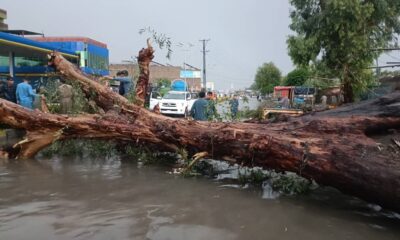
 Latest News5 days ago
Latest News5 days agoOne dead, dozens injured as powerful storm strikes Jalalabad, Afghanistan
-

 Latest News4 days ago
Latest News4 days agoEx-Afghan deputy speaker Qadeer back in Kenyan court for criminal case
-
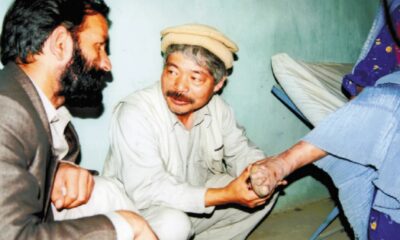
 Health5 days ago
Health5 days agoJapanese charity Peshawar-Kai to resume leprosy treatment in Afghanistan
-

 Sport5 days ago
Sport5 days agoIndia suspends Indian Premier League T20 cricket tournament
-

 Latest News4 days ago
Latest News4 days agoPakistan says India launched attack on Afghanistan, India denies
-

 Latest News4 days ago
Latest News4 days agoMCC Chief: Afghan cadres sent to China for AI training
-

 World3 days ago
World3 days agoUS offers to help India and Pakistan start talks, G7 also urges dialogue




